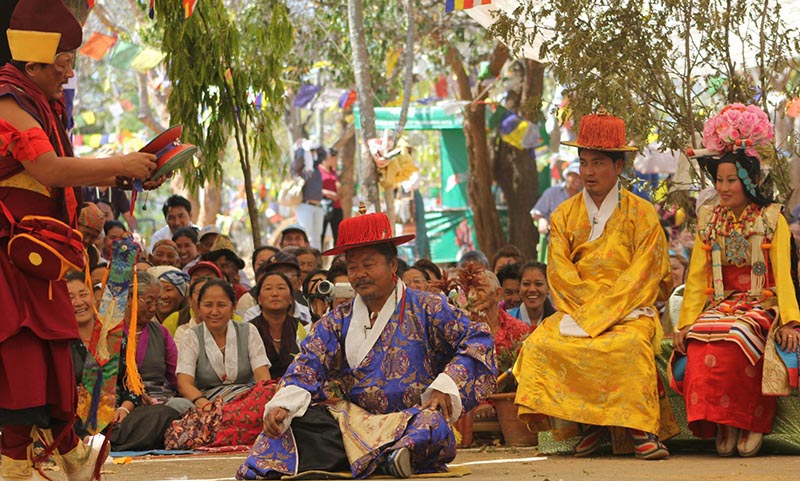In this long and winding tale, a malicious king of a Southern Indian kingdom eye enviously his more prosperous northern neighbor and attempts to lure the nāgas of the northern lakes, who are the source of its pros to the Southern Kingdom. He employs an immoral yogi to do this who is thwarted by a valiant hunter who lives by the side of the lake. The naga queen in gratitude invites the hunter to the nāga realm deep in the lake and there she gives him a special wish-granting jewel. The hunter takes the jewel and approaches a well-intended yogi, who explains its powers. The hunter learns of a nearby celestial bathing pool visited by goddesses, and he persuades the yogi to take him there. The hunter becomes smitten by Manoharā, the most beautiful of the goddesses, and returns to the Naga Queen to obtain from her a jewel with lassolike powers capable of ensnaring anyone.
PRINCE NORSANG

He persuades her to part with it, and returning to the celestial bathing pools with the yogi, he seizes Manoharā. The goddess is saddened by the prospect of having to spend her life with a low-class hunter and would rather die. Concerned, the yogi persuades the hunter to offer Manoharā to the noble king of the northern kingdom, Norsang, in return for a position of power.
Norsang takes Manoharā for his wife and rewards the hunter. His other queens begin to resent Manoharā, calling her a wanderer who was brought into the kingdom by a hunter. They approach a yogi called Hari and deceitfully persuade him to separate the couple. Hari causes the king’s father to have troubling dreams, as a consequence of which he approaches Hari and asks for a divination. Hari tells him there are wicked wild men of the north plotting to overthrow the kingdom, and only Norsang can defeat them.
After a great ceremony, Norsang is sent away to do battle in the north. Meanwhile the queens plot to kill Manoharā. Hari persuades Norsang’s father that Manoharā is in fact a demon, and that her heart should be torn out and its fat used in a bathing ritual as a way to appease the troubles that were befalling the kingdom. The father is persuaded and provides weapons for the queens to attack Manoharā’s palace. However, she is able to escape by flying into the skies using a special necklace given to her by the yogi who helped set her free from the hunter.
Manohară disappears and sets off to her celestial realm, but before she reaches it she visits her yogi friend and tells him how Norsang should navigate his way to her home, if he decides to come and bring her back.
After a long journey and a battle, Norsang defeats the enemies of the north and returns home. There he finds his beautiful wife has disappeared. He realizes what has happened and sets out to search for her. Receiving directions from the yogi, he eventually travels to the celestial realm that was her home. Skillfully negotiating the traps laid for him, he meets up with Manoharā again. However, her father, the celestial king, is unwilling to let her go back to the human realm and has other suitors in mind. An archery contest is arranged, with the winner to take Manoharā as his queen. Norsang wins and leads her back to his kingdom. They are welcomed back, Hari and the queens are punished, and all is restored.
This complex story is said to be based on a Jataka tale of the same name retold in Wish-Fulfilling Tree of the Bodhisattva’s Lives, a collection of stories told in a rich poetic form by the thirteenth-century Kashmiri author Kșemendra, and which was translated into Tibetan alongside the Sanskrit original and placed in the Tengyur. Later, in the seventeenth century, the Fifth Dalai Lama oversaw its publication, thereby ensuring its popularity. Also, Thupten Jinpa points out that in the thirteenth century the Tibetan master Karma Rangjung Dorjé compiled a collection of Jataka tales from the Sutra and Vinaya collection of the Kangyur, known as The Hundred Jataka Tales, and the Norsang Jataka is the eighty-eighth of that collection. The folk opera of Norsang reproduced in this volume and other versions found these days in the Tibet canon differ considerably from their Jataka origins, although the characters and basic exploits run through all versions. The version in this volume was compiled by Dingchen Tsering Wangdü, an eighteenth-century official at Shelkar Dzong Monastery in southern Tibet.
Norsang is considered to be the oldest written opera in Tibet, and melodies from other operas have been copied from those performed in it. Moreover, the hunter and the prince who appear in the prologue of all Tibetan operas are based on the hunter and the prince Norsang of this opera.









